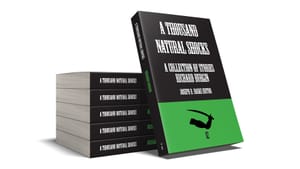Stay in the Loop
BSR publishes on a weekly schedule, with an email newsletter every Wednesday and Thursday morning. There’s no paywall, and subscribing is always free.
Head games
'A Thousand Natural Shocks: A Collection of Stories,' by Richard Burgin

Local readers will not only perhaps recognize some of themselves in Richard Burgin’s short story collection A Thousand Natural Shocks: A Collection of Stories, but their own surroundings as well; Burgin lived and taught in Philadelphia for more than a decade, and about a third of the stories in this volume are set here. Some of the locales, such as Rittenhouse Square (“My Black Rachmaninoff”) and University City (“Do You Like This Room?”) are upscale. Others, like the seedier playgrounds in “The Dealer” and “Ghost Park” or the hooker district in “Vacation,” convey a granular sense of the city’s texture and variety, the complexities of its race relations, and the pressures of urban gentrification.
Burgin’s stories jump out at you. This happens literally at the beginning of “The Spirit of New York,” one of the 25 tales mostly culled from his dozen volumes of short fiction: “I scare people, usually women, I admit. I don’t hurt them, or even wish to; I simply jump out at them, or suddenly appear from a corner or doorway or from behind a parked car or tree. After they gasp or scream I apologize profusely and try to calm them down. I do it so they think it could have been an accident. Almost immediately I feel remorse and hope they forgive me, but it’s also true I feel tremendous pleasure as well.”
Well, a pervert. But what makes a pervert, what is perversion anyway, and what does it tell us about the behavior we take to be normal? The unnamed protagonist plays a child’s game in an adult’s body, which he fantasizes grows taller as he stalks his prey.
The spark of fright he generates, the flash of power it gives him, is orgasmic in its satisfaction, and in this we see Burgin’s larger picture. Communication limited to sudden arousal followed by immediate denial: this is the very picture of urban anomie, eight million people suddenly so close they could not be further apart.
Who are you?
Burgin’s real theme, though, is identity. One of his best stories (and the title of one of his books) is “The Identity Club.” Most of his stories are written in the first person, but who the “person” might be is precisely the question; the suppositional glue that holds a self, once called a soul, together is simply absent.
As the protagonist of “Do You Like This Room?” observes, “Fifteen or 20 seconds — that’s all it took to become a ghost.” Burgin’s characters do interpenetrate — often sexually — but, as in “Spirit,” no real contact is made; rather, the sense is of vacancies passing through each other.
This might seem a device that could pall, but Burgin’s off-kilter plots, his unerring ear for dialogue, and the deadpan wit that makes even surreal situations plausible continually refresh his theme. His characters are, in one way or another, quest-heroes, questing after their own selves. This requires an Other who alone can define and validate the absent hero.

Sometimes the quest requires a victim; sometimes it is an act of exposure that leaves one vulnerable to a stranger (the game of “Spirit” combines both). But the result is a hall of mirrors in which no one’s face is clearly seen.
Crisis of character
As Burgin’s heroes try to find themselves, the one thing they cannot escape is memory. For most of us, memory is indispensable, giving the self continuity through time. For Burgin, it is mostly the recollection of failure.
The members of the Identity Club deal with this by assuming the personae of admired figures from the past whose careers they emulate and whose lives they reenact. This will include their deaths, which are foreknown and which also must be experienced. Of course, living someone else’s life doesn’t do away with the problem of memory; it simply substitutes another’s memories for one’s own.
If memory is the key to personality, does one want more or less of it? Burgin poses this question in “Memo and Oblivion,” whose title denotes memory-enhancing or -depleting drugs. The secret societies that control these are at war with each other, as we are with our desires to remember pleasure and forget pain. At one extreme lies the tormented sinner with all the leisure of hell; at the other, the zombie who acts and forgets simultaneously.
The crisis of character has been the central preoccupation of modern fiction. Darwin deconstructed the physical world in which it was enacted; Freud deconstructed the stable personality that exhibited traits and deployed virtues within it. Proust, Joyce, Kafka, Woolf, Musil, and Beckett all displayed the result.
These were the heroic figures of modern literature. Burgin is one of our keenest investigators of the condition they have left us — and a worthy successor. His tools are not theirs, but his wit, irony, and sense of the uncanny are uniquely suited to our moment and milieu.
What, When, Where
A Thousand Natural Shocks: A Collection of Stories. By Richard Burgin. Goliad Press, 2018. 400 pages, softcover; $14.99. Click here.
.
Sign up for our newsletter
All of the week's new articles, all in one place. Sign up for the free weekly BSR newsletters, and don't miss a conversation.

 Robert Zaller
Robert Zaller